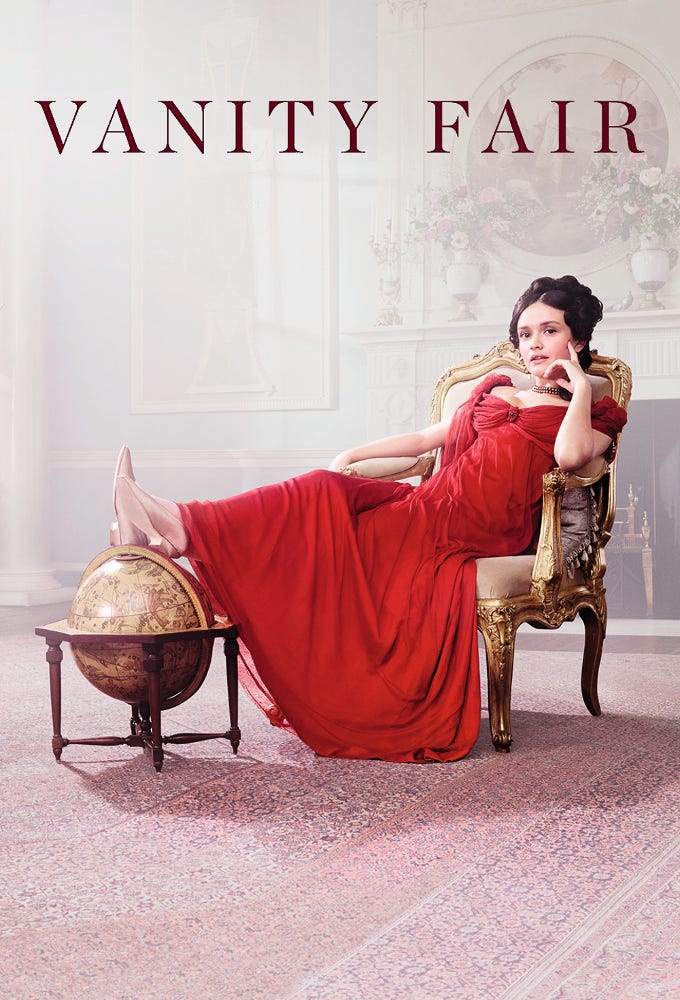Having Bridgerton withdrawal symptoms? Watch Vanity Fair
Why are we so captivated by the stories of women whose lives are totally defined by marriage?
This is the midweek what-to-watch edition of Snarky Senior — the newsletter from Erica Manfred, which you can read about here. If you like it and don’t want to miss an issue, you can get it in your inbox by subscribing.
What is it about the British aristocracy and Regency era dramas? Why are we so captivated by the stories of girls whose lives are totally defined by marriage? Why is the quest for a suitable mate so endlessly fascinating? What do we love about girls with elaborate hairdos who are strapped into corsets so tight they can hardly breathe and burdened with layers of heavy skirts while they navigate the dangerous terrain of obtaining a proper marriage?
I think it’s a combination of horror and fascination with a soupcon of envy.
We’re fascinated by the outfits which are simultaneously demure and sexy: Corsets that give women an hourglass shape even if they make it impossible to breathe and layers of skirts that have a life of their own. Breasts that burst out of low cut bodices and bustles that suggest a prominent behind.
Today’s minimalist clothing may be comfy, but it can’t compare to the glamour of yards of fabric and wasp waists. That’s why brides spend a fortune on a gown they’ll wear once.
The horror is in being trapped in those clothes—and in that life--which may look gorgeous but which we know is massively restricting-- a fate where you can be married off to someone you don’t even like if he’s rich enough.
The envy is having a ladies maid to strap you into that corset and help you put on those clothes, and a nanny to take care of the kids while all you have to do is go to balls and order elaborate meals for dinner parties.
We liberated women get to wear what we want and marry who we want. But does this make us happy? We get to work, but too often in non-glamourous dead end jobs where we get paid less than we deserve and then have to go home and take care of a family. We get stuck in miserable marriages too and have only ourselves to blame. Ergo, our fascination with rich aristocratic women who are equally unhappy, but not by choice, and at least they get to wander around in castles and get waited on by obsequious servants while they’re being oppressed. Plus they don’t have to be apologetic for gossiping or being snobs.
Being modern, we want to have it all our way, so Shonda Rimes has given us Bridgerton where we get more outrageous outfits, and a modern vibe with lots of sex. No lack of sexism though. That’s what it’s all about—oppressing women in glamorous settings.
While undergoing Bridgerton withdrawal I discovered a similar but much superior series-- Vanity Fair--a British show that adapts Thackeray’s satire about Becky Sharpe, a poor girl who tries to parlay cleverness, a pretty face and a lack of scruples into a good marriage.
Poor Becky keeps running afoul of her own sexual impulses, an outside world of snobs and social climbers who want to undermine her, and history itself which throws the Napoleonic War at her just when she finds someone to settle down with.
Like Bridgerton it uses modern music and has a distinctly modern sensibility but unlike Bridgerton it has a stellar British cast, including Martin Clunes, Michael Palin, and especially Frances de la Tour as Aunt Matilda, an old lady who has too much money and not enough fun. It stars the uber-talented Olivia Cooke as the heroine, who uses her impressive gift for comedy to turn a scheming, unscrupulous, social climbing liar into a sympathetic heroine. Cooke has acting chops to spare. It’s not easy to be simultaneously steely and winsome. Unlike Phoebe Dynavour’s, Daphne, the insipid “good girl” lead of Bridgerton, Olivia Cooke as Becky Sharpe is a complicated character, capable of both loyalty and betrayal, cruelty and kindness, wit and wisdom.
The one thing the two shows have in common is a celebration of female friendship. The only person Becky doesn’t betray is her BFF, Amelia, even though Amelia rejects Becky at one point for telling the truth about her cheating husband. Becky may be a total con artist, but she sticks by her best bud. The happy ending comes not when Becky captures a rich husband (though of course she does) but when she and Amelia reconcile.
Girl power rules in both shows, defying the reality of life for women in that era. But we wouldn’t have it any other way.
Spread the snark!
If you know someone who doesn’t take themselves too seriously and might enjoy some snark in their inbox once or twice a week, forward this newsletter their way. You can subscribe (and link to it) here. Email me anytime at Askerica@gmail.com. Suggestions and feedback welcome.




